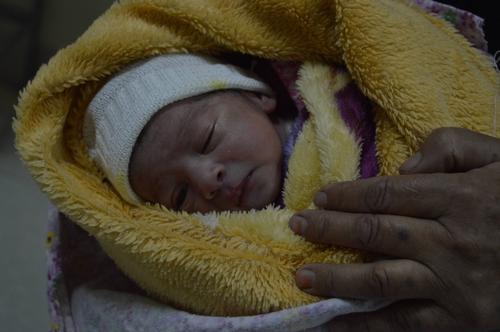- MSF has opened a maternity clinic in Tal Maraq, where the conflict has taken a heavy toll on the population.
- For the first time in two years women in the area now have access to reproductive health services to ensure safe deliveries.
The ongoing conflict and the lack of functioning healthcare structures in the Tal Afar and Mosul districts are preventing the population in the area from accessing healthcare. People have to travel over 100 kilometres to urban areas such as Dohuk and Zakho to seek specialised medical care, a long trip that is too expensive for many people. As a consequence, many women deliver at home.
The new maternity clinic in Tal Maraq is the only healthcare facility in Tal Afar district that provides sexual and reproductive health services, including ante- and postnatal care and safe deliveries for non-complicated cases. The clinic also offers stabilisation and referral services for more complicated emergency cases.
“Since we started 24/7 services in the maternity clinic in November 2016, we have assisted more than 125 deliveries. It is wonderful to see more and more women accessing this facility, where they can deliver their babies safely”, says Vanessa Rossi, project coordinator in Tal Maraq.
The maternity is located in a building that was intended as a primary healthcare centre, but that due to the conflict was never used as such. In July last year, MSF started to rehabilitate and adapt the building in order to install the maternity unit. By the beginning of this year, MSF will open an inpatient department for paediatric cases (children under 12 years) in the same building, as well as a stabilisation unit for adults with life-threatening conditions. This is in anticipation of a potential influx of people fleeing from the military campaign in the cities of Mosul and Tal Afar, and to address the current lack of secondary healthcare facilities in the area.
MSF has been providing healthcare to populations affected by violence in Tal Afar district since January 2015. Mobile medical teams provide general consultations, mental health services, and sexual and reproductive health consultations in three subdistricts.
MSF’s response to the current humanitarian crisis in Iraq consists of providing free, quality primary and secondary healthcare services and relief to displaced families, returnees and impoverished host communities. This is done using a flexible approach such as deploying mobile medical teams according to population movements and arising needs to target those who cannot access medical care.
MSF has worked continuously in Iraq since 2006. In order to ensure its independence, MSF does not accept funding from any government, religious committee or international agency for its programmes in Iraq, and relies solely on private donations from the general public around the world to carry out its work. In Iraq, MSF currently employs over 900 staff.



